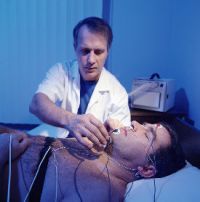Insomnia Research
 People suffering from insomnia are more likely to experience various daytime symptoms, including a lack of alertness, negative mood and sleepiness.
People suffering from insomnia are more likely to experience various daytime symptoms, including a lack of alertness, negative mood and sleepiness.This research was presented at the 20th anniversary SLEEP meeting of the Associated Professional Sleep Societies (APSS) at Salt Lake City’s Salt Palace Convention Center from June 17-22.
Researchers of the University of Pittsburgh School of Medicine studied 47 subjects with primary insomnia and 18 good sleepers. It was discovered that the primary insomnia group had significantly worse scores than good sleepers in the categories of termed alert cognition, negative mood, positive mood and level of fatigue/sleepiness.
Insomnia is a classification of sleep disorders in which a person has trouble falling asleep, staying asleep or waking up too early. These disorders may also be defined by an overall poor quality of sleep.
Insomnia is a condition that is suffered by thirty percent of the U.S. population. Some medical conditions cause insomnia, or it may be a side effect of a medication. A person with insomnia may feel tired during the day, have trouble concentrating at work or fall asleep during the day.
For most people, insomnia lasts only a few days and goes away without treatment, but stress or depression can cause a higher level of insomnia that may last for several weeks. This kind of insomnia may not go away on its own. In this case, persons are advised to consult with their primary care physician, who will determine whether a visit to a sleep specialist is necessary.

0 Comments:
Post a Comment
<< Home